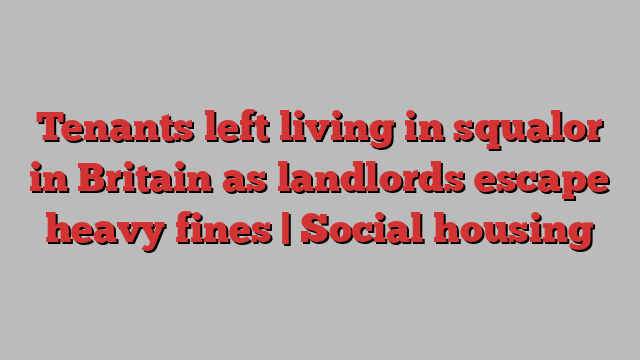
Leading private providers of social housing in Britain have been made to pay out only a few hundred pounds on average in financial penalties for severely mistreating tenants, the Observer can reveal.
An analysis of every decision made by the housing ombudsman, the primary regulator of social housing in Britain, shows that across the 2,907 rulings it made in the past three years, the average financial penalty for housing associations was just £445.
Housing associations are privately owned nonprofit companies that run 63% of social housing in the UK. They have recently come under increasing scrutiny and the number of complaints about serious disrepair have skyrocketed in the aftermath of the mould-related death of toddler Awaab Ishak in December 2020.
The two-year-old died after his family’s housing association, Rochdale Boroughwide Housing, repeatedly failed to treat endemic problems with damp and mould in their home.
Instead of issuing fines for repeat offences, the ombudsman mainly acts as a mediator, handling individual complaints by tenants who have been mistreated and ordering the landlord to pay compensation when they have failed to stick to their legal duties.
The new analysis covered three main types of issues ruled on by the ombudsman: service failure, the more serious maladministration, and severe maladministration.
Even in cases of severe maladministration, where landlords have systematically refused to fix endemic damp and mould issues for years or left tenants living in squalor, the ordered compensation was often just a few hundred pounds.
There are occasions when fines are bigger, however. In one of the most extreme cases, one housing association left a resident with maggots falling from the kitchen ceiling due to dead rats, resident with maggots falling from the kitchen ceiling due to dead rats, mould growing on the walls and other repairs failures. It was ordered to pay £2,300 as a settlement by the ombudsman.
“Our data shows that tenants are getting a raw deal across the board, with very little regulation of the housing sector taking place,” said Maia Kirby of Good Jobs First, a nonprofit that focuses on corporate accountability.
Part of the reason the recorded figures are so low is that the ombudsman usually decides on settlements based on the amount of rent paid by the tenant over the course of the period covered by the complaint.
Its rulings were historically recommendations, which social landlords were not duty bound to adhere to, although changes to the law in 2021 gave the ombudsman the ability to order social landlords to take action and look beyond individual cases in some situations.
While in theory another regulator – the regulator of social housing – has the ability to fine housing associations, it has historically had more of a focus on poor business practice” for housing quality.
“It is obvious that such weak sanctions make little impact, and they certainly don’t drive strategic change,” said Suzanne Muna, secretary of the Social Housing Action Campaign. “The housing ombudsman’s own reports show that landlords increasingly feel they can ignore the orders to carry out repairs or pay compensation because there is no meaningful consequence when they do so.
after newsletter promotion
“What has to happen is a complete reformation of public housing to bring it under the control of councils, which at least have some democratic accountability, and to fund it properly.”
While the data given to the Observer shows the total amount of compensation ordered by the ombudsman, in several cases it was unclear if the payouts ordered were in addition to or part of any existing financial settlement agreed by the housing association and tenant.
“In the past year, we have increased the amount of compensation we are offering per case and are now regularly compensating based on the rent paid by the resident during a period of service failure,” housing ombudsman Richard Blakeway told the Observer.
“We have recently ordered over £10,000 in several cases that are due out in the coming months. In 2022-23, we awarded over £1m in compensation for the first time, and that was almost double the amount from the previous year.”
A spokesperson for the Department for Levelling Up, Housing and Communities said: “We are introducing Awaab’s law, forcing social landlords to address hazards such as damp and mould within strict timeframes. We want all tenants to feel empowered to stand up to bad landlords and go to the ombudsman when issues remain unresolved.”